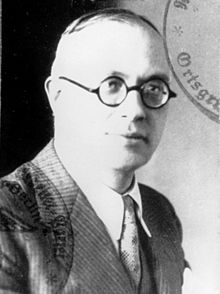
Back مارتن لوثر (سياسي) Arabic مارتن لوثر (دبلوماسى من المانيا) ARZ Martin Luther (diplomat) Danish Martin Luther (Unterstaatssekretär) German Martin Luther (diplomaatti) Finnish Martin Luther (diplomate) French מרטין לותר (דיפלומט) HE Martin Luther (diplomatico) Italian マルティン・ルター (外交官) Japanese Martin Luther (ambtenaar) Dutch
Martin Luther | |
|---|---|
 | |
| Undersecretary (from July 1941) Head of Abteilung D (Deutschland) Reich Foreign Office | |
| In office 7 May 1940 – 10 February 1943 | |
| Minister | Joachim von Ribbentrop |
| Head of Referat Partei Reich Foreign Office | |
| In office November 1938 – 7 May 1940 | |
| Minister | Joachim von Ribbentrop |
| Head of Party Liaison Office Ribbentrop Bureau | |
| In office August 1936 – November 1938 | |
| Personal details | |
| Born | 16 December 1895 Berlin, German Empire |
| Died | 13 May 1945 (aged 49) Berlin, Soviet occupation zone |
| Occupation | Businessman Diplomat |
| Known for | Wannsee Conference participant |
| Military service | |
| Allegiance | |
| Branch/service | Imperial German Army |
| Years of service | 1914–1918 |
| Rank | Leutnant der Reserves |
| Battles/wars | World War I |
| Awards | Iron Cross, 2nd class |
Martin Franz Julius Luther (German: [ˈmaʁtiːn ˈlʊtɐ] ⓘ, 16 December 1895 – 13 May 1945) was a German diplomat. A member of the Nazi Party, he was a protégé of Foreign Minister Joachim von Ribbentrop, first as an advisor in the Ribbentrop Bureau (Dienststelle Ribbentrop), and later as a diplomat in the Foreign Office (Auswärtiges Amt). He participated in the 20 January 1942 Wannsee Conference, at which the genocidal Final Solution to the Jewish Question was planned. It was the 1946 discovery of his copy of the minutes of that conference that first brought to light the existence of the conference and its purpose. After plotting to replace Ribbentrop, Luther was arrested in February 1943 and sent to a concentration camp. He died of natural causes very shortly after the end of the Second World War in Europe.